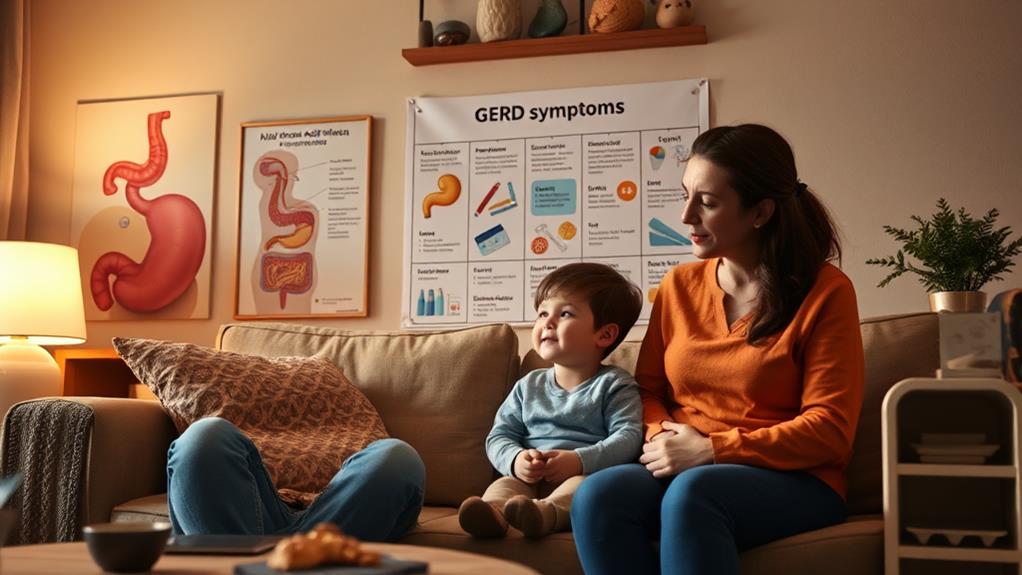Understanding GERD in Kids: Causes and Treatments
When it comes to understanding GERD in kids, you might notice your child experiencing frequent heartburn or a persistent cough that just won't go away. These symptoms can be concerning, and it's essential to know that they often stem from stomach contents flowing back into the esophagus. You may wonder what causes this condition and how it can be effectively managed. By exploring risk factors and treatment options, you can better equip yourself to address your child's needs and prevent complications down the line. What steps can you take to ensure your child finds relief?
What Is GERD?

When it comes to understanding pediatric health issues, recognizing what gastroesophageal reflux disease (GERD) is can be crucial for parents. GERD occurs when the contents of the stomach flow back up into the esophagus, causing discomfort and potential complications. This happens because the lower esophageal sphincter, a muscle that acts like a valve between the stomach and esophagus, doesn't function properly.
In children, GERD can manifest differently than in adults. While infants often experience spit-up, older kids might complain of heartburn or chest pain. It's important to know that GERD isn't just a normal part of growing up; it can lead to other health issues if left untreated.
Factors contributing to GERD in kids might include obesity, certain foods, and even laying down right after meals. Understanding these causes can help you identify potential triggers for your child.
Common Symptoms in Children
Although GERD can affect children in various ways, recognizing the common symptoms is essential for timely intervention. One of the most noticeable signs is frequent heartburn, where your child may complain of a burning sensation in their chest or throat. You might also notice them having trouble swallowing or experiencing a sensation of food getting stuck.
Another symptom to watch for is regurgitation, where they might spit up or vomit, often accompanied by sour-tasting fluid. This can be distressing for both you and your child. They may also experience chest pain, which can sometimes be mistaken for other issues.
Additionally, persistent cough or wheezing can occur, especially if acid reflux irritates their airways. If your child seems to have poor appetite or is refusing meals, it could be a sign of discomfort related to GERD.
Keep an eye out for unexplained irritability or difficulty sleeping, as these can also indicate that something's not quite right. By being aware of these symptoms, you can help ensure your little one gets the care they need to feel better and thrive.
Risk Factors for GERD

Recognizing the common symptoms of GERD is just the beginning; understanding the risk factors can help you identify if your child is more susceptible to this condition. Certain factors may increase your child's chances of developing GERD, so being aware can make a difference.
One significant risk factor is age. Infants and toddlers are more prone to reflux due to their developing digestive systems.
If your child is overweight, that can also play a role, as extra body weight can put pressure on the stomach, leading to reflux. Additionally, a family history of GERD may mean your child is at a higher risk; if you or other family members have experienced similar issues, keep an eye on your child's symptoms.
Diet is another important factor. Certain foods, like chocolate, caffeine, or spicy dishes, can trigger symptoms.
Plus, if your child eats large meals or lies down right after eating, that can worsen the situation. Lastly, some medications can contribute to GERD.
Diagnostic Procedures
Diagnosing GERD in kids involves a series of procedures that help pinpoint the issue accurately. First, your doctor will likely start with a thorough medical history and physical examination. They'll ask about your child's symptoms, like heartburn or regurgitation, and how often they occur. This step is crucial since understanding the frequency and severity can guide further testing.
Next, your doctor might recommend an upper GI series, which involves taking X-rays of your child's esophagus and stomach after they swallow a special contrast liquid. This test helps visualize any abnormalities.
Another common procedure is an endoscopy, where a thin, flexible tube with a camera is inserted down the throat to examine the esophagus and stomach closely.
In some cases, your doctor may suggest a pH probe study to measure the acidity in your child's esophagus over a 24-hour period. This helps determine if acid reflux is indeed the problem.
Dietary Modifications

Once your child's GERD has been diagnosed, dietary modifications can play a significant role in managing symptoms. You might want to start by keeping a food diary to identify any specific triggers that worsen your child's reflux. Foods high in fat, chocolate, and citrus fruits are common culprits, so consider limiting or avoiding these items.
Encourage your child to eat smaller, more frequent meals instead of large ones. This can help reduce pressure on the stomach, minimizing the chances of acid reflux.
Also, make sure your child avoids eating right before bedtime. It's best to allow at least two to three hours between meals and bedtime.
Incorporating more fiber-rich foods like whole grains, fruits, and vegetables can be beneficial. These foods can help with digestion and may ease symptoms.
You might also consider having your child drink plenty of water throughout the day, which can help dilute stomach acids.
Lastly, be mindful of portion sizes and the overall balance of meals. Implementing these dietary changes can make a big difference in your child's comfort level and overall well-being.
Medical Treatments
When it comes to managing GERD in kids, medical treatments can provide significant relief. Your doctor may recommend medications to help reduce stomach acid and ease discomfort. One common option is antacids, which neutralize acidity and can offer quick relief.
You might also hear about H2 receptor antagonists, like ranitidine or famotidine. These medications decrease acid production, helping to reduce the frequency of those pesky reflux episodes.
Another option is proton pump inhibitors (PPIs), such as omeprazole or lansoprazole. These are often prescribed for more severe cases, as they provide stronger acid reduction over a longer period. If your child's GERD symptoms are persistent, your healthcare provider may suggest a combination of treatments for the best results.
It's essential to follow your doctor's instructions closely, as they'll tailor the treatment plan based on your child's specific needs and symptoms.
Lifestyle Changes

While medical treatments play a significant role in managing GERD, lifestyle changes can also make a big difference in your child's comfort and overall health.
First, consider your child's eating habits. Encourage smaller, more frequent meals instead of large ones. This can help reduce the pressure on their stomach, lessening the chances of reflux.
Next, keep an eye on what they eat. Spicy foods, citrus fruits, and chocolate can trigger symptoms in some kids. Try to identify any specific triggers and limit those foods.
Additionally, make sure your child stays upright for at least two to three hours after eating. This simple adjustment can prevent stomach acid from flowing back up into the esophagus.
Weight management is another essential factor. If your child is overweight, even a small amount of weight loss can improve symptoms.
When to Seek Help
Knowing when to seek help for your child's GERD can be crucial in managing their symptoms effectively. If your child frequently experiences heartburn, regurgitation, or discomfort after meals, it might be time to consult a pediatrician. These symptoms can affect their appetite and overall well-being, so don't hesitate to reach out for support.
Watch for other warning signs that could indicate a more serious issue. If your child has difficulty swallowing, persistent vomiting, or shows signs of dehydration, it's essential to seek medical attention right away.
Additionally, if they start losing weight unexpectedly or seem excessively irritable, these could be red flags.











Post Comment